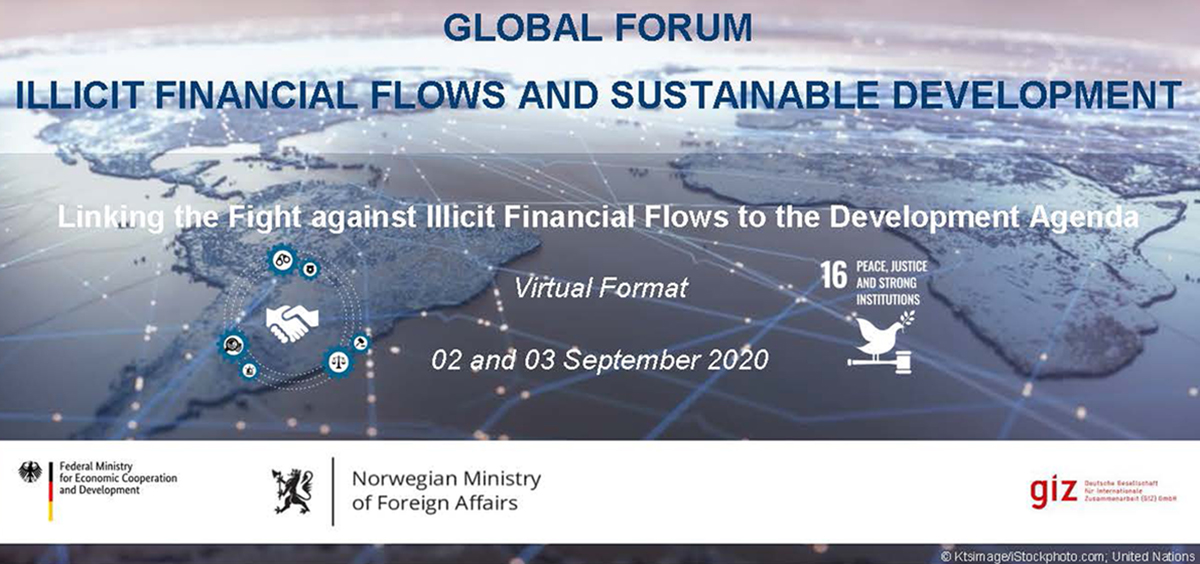How developed countries can support asset recovery for sustainable development

Basel Institute on Governance Managing Director Gretta Fenner moderated a discussion on Finding stolen assets – the role of transparency and proactive measures in developed countries at the new Global Forum on Illicit Financial Flows and Sustainable Development series. Hosted by Germany and Norway, the event takes place over two days starting 2 September 2020.
Speakers from the World Bank / UNODC Stolen Asset Recovery Initiative, Germany and Tunisia explored what needs to be done in countries that serve as transition or destination countries of stolen assets. How are these countries able to contribute more to global asset recovery efforts?
Key points
1. Anti-money laundering and counter financing of terrorism (AML/CFT) frameworks in financial centres around the world are still much too weak.
This is both in terms of effective enforcement and underlying regulations/institutional set-ups. These weaknesses provide criminals with excellent “get-away cars” in the form of opportunities to launder, hide and re-invest their assets with little risk of being detected.
In order to enhance the capacity of law enforcement to better detect and trace stolen assets, it was recommended that domestic AML/CFT regulations need to address the challenges arising from legal professional privilege on the one hand, and corporate secrecy on the other hand.
This is because both act as effective veils to financial crime. We are seeing some momentum regarding corporate secrecy around the establishment of beneficial ownership registries. However, the crux of the matter, namely how to verify whether the information in the registries is correct, is still not resolved. Lawyer groups are so far very successful in lobbying against any changes to their professional privileges.
2. AML/CFT regimes and investigation tools do not sufficiently take into account the fact that methods for detecting stolen assets vary depending on the role of a jurisdiction in the laundering process.
One such weakness identified during the panel was that so-called “destination jurisdictions”, i.e. where laundered assets are ultimately placed, do not always have or effectively use centralised registries for key placement opportunities, such as real estate or corporations. This relates to the above point on beneficial ownership. This weakness severely restricts the capacity for proactive investigation, which could provide key information for detecting and recovering stolen assets in requesting and requested states alike.
3. Financial centres need to do more to proactively identify and investigate stolen assets located in their jurisdictions.
The discrepancy between assets that are stolen and assets that are found is far too large for it to be credible that such small amounts of assets are effectively found in major financial centres. This is true even if we deduct stolen assets that may have already been spent and re-invested.
Financial centres often do not prioritise international corruption and money laundering cases because they are considered too complex and time consuming. Meanwhile, prosecuting services in most countries are overwhelmed with work. It is therefore imperative that financial centres invest more in relevant law enforcement capacity. This needs to be coupled with strong messaging from the highest level of political leadership that tackling illicit financial flows is a top priority. In addition, law enforcement in financial centres would benefit from additional legal tools, such as the introduction of the reversal of the burden of proof for a specific set of crimes.
More resources will also lead to more responsiveness of financial centres in the context of international cooperation, which is still insufficient and far too slow to tackle a 21st-century crime. Challenges for requesting states to tackle complex international cases include:
- disparities between legal systems and legislative frameworks governing international cooperation;
- limited experience in tracing assets in most countries, even those with advanced enforcement systems;
- human rights thresholds for executing mutual legal assistance (MLA) requests and maintaining freeze orders.
Greater efforts are also needed to further harmonise the legislative framework governing international cooperation. Requesting states are overwhelmed when having to deal with multiple jurisdictions in parallel.
4. The management of restrained assets is a concern.
Participants suggested analysing whether development banks or centrally managed escrow accounts could be used to ensure that such assets are protected and well managed.
About the Global Forum on IFF and Sustainable Development
Today’s event was the first in a new series hosted by the German Federal Ministry for Economic Cooperation and Development (BMZ) and the Norwegian Ministry of Foreign Affairs and organised by the Deutsche Gesellschaft für Internationale Zusammenarbeit (GIZ).
The aim of the Forum is to establish dialogue across stakeholders, countries, regions and sectors on the following question: How can measures and policies to combat illicit financial flows can have the greatest possible impact on the advancement of SDG 16.4 without adversely affecting other goals of the sustainable development agenda?
Further reading
- See a description of a 2019-2022 programme on Combating Illicit Financial Flows commissioned by the BMZ and Norwegian Ministry of Foreign Affairs.
- View a study on Stolen Asset Recovery Between Germany and Developing Countries commissioned by BMZ and GIZ and published in 2019 by the Civil Forum for Asset Recovery (CiFAR).



